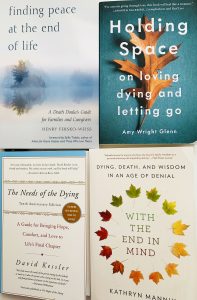Lately, I’ve been thinking a lot about death and dying.
Mostly it’s because I’m starting a new romance novel that features a character who is a death doula (cue the jokes and the confusion about writing a romance novel around death, haha!). But I suppose it’s also because I’m in the latter half of my own life now and have elderly parents and in-laws, and so it seems like the right time to delve into this great and final mystery. Plus, I like to challenge my writer’s self with unusual topics.
There is another reason, too. Frankly, I’m a bit haunted.
A former colleague and friend died more than three years ago after a very sudden and short terminal cancer diagnosis. He was only in his early 50s, with two teenagers at home and a wife who was battling her own health issues. He didn’t want to go, understandably so. In the short time he had remaining after his diagnosis, he could not come to terms with his own dying. He became depressed. He cheated himself out of talking about it, of comforting his family, of allowing himself to be comforted, and of coming to some kind of peace with how his life was going to end. Things progressed so quickly, that my goodbye had to be in the form of an email that was read out loud to him.
I think too about my grandmother, who died a year or so after my friend, at the age of 99. She’d been “ready to go”, as she phrased it, for a few years. Her husband and friends were all gone, her quality of life in the nursing home wasn’t so great anymore. Life had little enjoyment or purpose. Although she began to hope to live long enough to celebrate a century of being on this earth, she was granted her wish “to go” in her sleep one night, three months before her 100th birthday.
I knew she was failing, and shortly before she died, I was able to tell her I loved her and she was able to tell me she loved me too. That gives me great comfort, but I do wish I’d talked more about death and dying with her because clearly, she was open to it by telling us she was ready to go. Our great failing is not in saying a final, proper goodbye and exchanging terms of endearment, but in sharing our feelings about dying, about death. When you think about it, after being born, dying is the second biggest thing that ever happens to us. And I don’t ever again want to be unprepared or unwilling to talk to someone openly and honestly about death and dying.
Maybe we avoid talking about death because we think talking about it means we wish for it to happen or that we’re going to jinx the universe somehow. Or we think we won’t be able to handle talking about it, that it will expose our own fears and weaknesses. I don’t know, maybe death is collectively more on our minds these days because of Covid, climate change, the general state of the world. I will be better prepared now for these difficult conversations, thanks to my research.
And man, is it hard. I have to be honest. In doing the research, I can only do it in small bites. Sometimes I have to walk away because the pages in front of me are swimming through my tears. And that’s okay, because you can’t write authentically about difficult subjects until you’ve faced them head on, no matter how wrung out the process leaves you.
I’m going to leave you with this quote from a book I’m reading called The Needs of the Dying by David Kessler: “If we understand that we are born, we flourish, and when our times comes, we die, we will live our lives from a meaningful place and live our deaths in a meaningful way.”